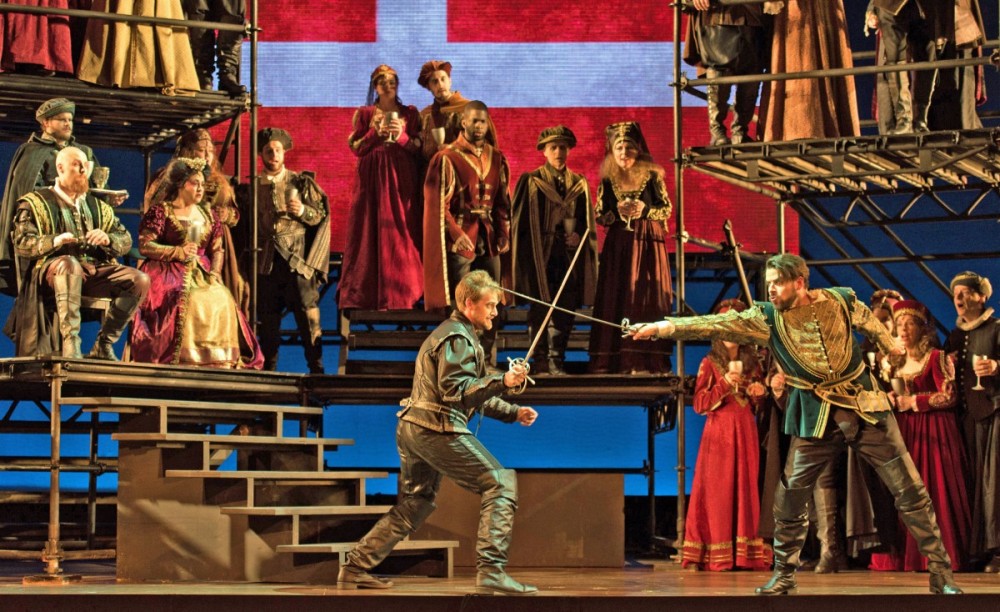
Arrigo Boito was the musician and playwright famed for turning Shakespeare plays into operas, such as Otello and Falstaff, where he worked in partnership with Giuseppe Verdi.
Historians rank those as two of the best operas of all time, and many theater-goers feel that Otello the opera is more dramatic than Othello the play, while Falstaff the opera is a superior amalgam of The Merry Wives of Windsor with Henry IV Part One.
No wonder, then, that the discovery of a long-lost Shakespeare adaptation by Boito has caused excitement. This time the music is not by Verdi, but by Franco Faccio, who is interesting in his own right.
Boito and Faccio were young graduates of the Milan conservatory who wrote a manifesto in 1861 advocating a modernization of Italian opera. Their timing was opportune; the Kingdom of Italy had just been proclaimed and change was in the air. Faccio was 21 and Boito was 19. Both young men wanted Italian arts to reflect the new reality that Italy was an independent nation on a level with Great Britain and France. This led to their belief that Italian music and theater could embrace the work of England’s greatest playwright, Shakespeare.
They wanted to get away from the formulas of bel canto utilized by Rossini, Bellini and Donizetti. They even wanted to go beyond what Giuseppe Verdi had achieved up until that point. Almost all of Verdi’s operas had followed the pattern of arias in a slow tempo followed by fast showpieces called cabaletti. Even his recent big hit, IlTrovatore, stuck to that formula, and also required the tenor to display a trill. Boito and Faccio wanted to get away from such routine.
Instead of showing off voices, they advocated greater use of the orchestra. And they called for more emphasis on serious dramatic art. Although they admired Verdi, they were upset by him giving prominence to gypsies, whores and drunks in his most recent opera, La forza del destino (1862) instead of concentrating on the essentials of the tragedy. Boito and Faccio did not attend its premiere in St. Petersburg, but we assume that they read the score — and the mixed reviews.
Boito was trained in composition as well as poetry and drama, and he worked closely with Faccio on adapting Shakespeare’s most famous play, Hamlet. In 1865 their joint enterprise made its debut in Genoa: Amleto, in Italian. The young men did not quickly follow up with other productions but, instead, got involved in other activities. Both enlisted in Garibaldi’s Italian army which fought against Austria in 1866 and 1867. Then Boito wrote the words and music for the opera Mefistofele while Faccio started a career as a conductor. He worked overseas, then returned to Italy, and La Scala scheduled a production of Amleto for the 1871 season.
The tenor in the title role was ill. When La Scala insisted that the show go on, Faccio objected. According to a musician of the time, the tenor was voiceless, he lowered pitches at will and omitted phrases, and the whole performance was “uncertain and disorganized.” An angry Faccio felt betrayed by the opera company and refused to allow any further appearances of his opera.
This may, to us, seem arbitrary, but both men embarked on other paths. Faccio became a conductor who specialized in Verdi’s later works. Boito composed his own music, and became the librettist for Verdi’s Simon Boccanegra, Otello and Falstaff. Faccio conducted the premiere of Otello but died before Falstaff.
Whereas both of them, in their youth, criticized Verdi, they were pleased by what Verdi wrote afterwards — Don Carlo with its broad tapestry of symphonic elements, then Aida, and then those masterful Shakespearian operas where he collaborated with Boito. Faccio clearly felt no further incentive to try to compete with Verdi as a composer.
The young conductor/musicologist Anthony Barrese heard about the lost opera and searched until he found an almost-unreadable piano/vocal manuscript in Faccio’s hand. The copy had faded so badly that the staff lines were not visible on many of the pages. Barrese reports that “I could at least identify the bass line and vocal lines, and everything else fell into place logically according to standard rules of harmony and counterpoint.” La Scala’s individual orchestra parts were lost during bombings by the Allies during World War II, but Barrese found Faccio’s orchestral manuscript and his reconstructed full score has now been published by Ricordi.
The opera received its first staged performance in 143 years in 2014 in Albuquerque, New Mexico in a production by Opera Southwest, conducted by Barrese. A new production in Wilmington by OperaDelaware is the first since then.
I’ve seen and heard it, and this is an opera that could be part of the repertory at major houses. Considering that it was only Faccio’s second opera, it’s a significant achievement. Consider what Verdi, Wagner and Puccini produced at that point in their careers: Un Giorno di Regno, Das Liebesverbot, Edgar — none of which have much life anymore.
Watch for my analysis and review. Read it here.
Please share your thoughts with us. Address to editor@theculturalcritic.com
Read other reviews on The Cultural Critic